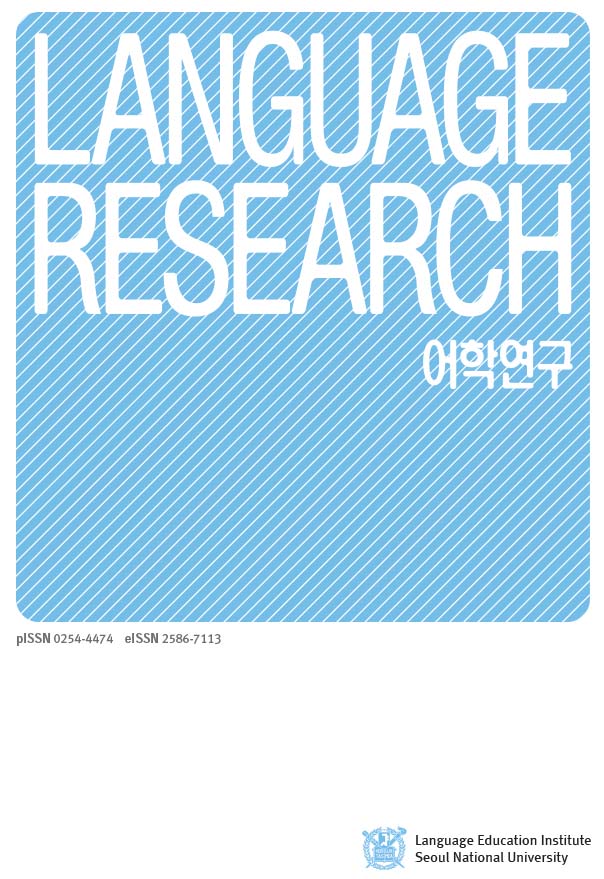Most Cited Articles
Effects of ChatGPT on Korean EFL Learners’ Main-Idea Reading Comprehension via Top-Down Processing
Lang. Res. 2024;60(1):83-106.
https://doi.org/10.30961/lr.2024.60.1.83
HTML
PDF
PubReader
Cited by 14
https://doi.org/10.30961/lr.2024.60.1.83
Foreign Language Anxiety and Self-Efficacy: Intermediate Korean as a Foreign Language Learners
Lang. Res. 2019;55(2):431-456.
https://doi.org/10.30961/lr.2019.55.2.431
HTML
PDF
PubReader
Cited by 9
https://doi.org/10.30961/lr.2019.55.2.431
A Case Study on English Test Item Development Training for Secondary School Teachers Using AI Tools: Focusing on ChatGPT
AI 도구를 활용한 중등교사 영어 출제 연수 사례 연구: ChatGPT를 중심으로
AI 도구를 활용한 중등교사 영어 출제 연수 사례 연구: ChatGPT를 중심으로
Lang. Res. 2023;59(1):21-42.
https://doi.org/10.30961/lr.2023.59.1.21
HTML
PDF
PubReader
Cited by 8
https://doi.org/10.30961/lr.2023.59.1.21
Examining Cloze Tests as a Measure of Linguistic Complexity in L2 Writing
Lang. Res. 2019;55(3):627-649.
https://doi.org/10.30961/lr.2019.55.3.627
HTML
PDF
PubReader
Cited by 7
https://doi.org/10.30961/lr.2019.55.3.627
Pre-Service Primary English Teachers’ AI Chatbots
초등영어 예비교사들이 개발한 인공지능 챗봇
초등영어 예비교사들이 개발한 인공지능 챗봇
Lang. Res. 2020;56(1):97-115.
https://doi.org/10.30961/lr.2020.56.1.97
HTML
PDF
PubReader
Cited by 7
https://doi.org/10.30961/lr.2020.56.1.97
On the Distribution of Missing Arguments and Adjuncts under the Pro Approach
Lang. Res. 2021;57(1):111-142.
https://doi.org/10.30961/lr.2021.57.1.111
HTML
PDF
PubReader
Cited by 6
https://doi.org/10.30961/lr.2021.57.1.111
An Acoustic Study of the Word-final Lateral Approximant in Korea
Lang. Res. 2017;53(2):231-245.
https://doi.org/10.30961/lr.2017.53.2.231
HTML
PDF
PubReader
Cited by 5
https://doi.org/10.30961/lr.2017.53.2.231
<φ, φ>-less Labeling
Lang. Res. 2018;54(1):23-39.
https://doi.org/10.30961/lr.2018.54.1.23
HTML
PDF
PubReader
Cited by 5
https://doi.org/10.30961/lr.2018.54.1.23
The Learner Corpora of Spoken English: What Has Been Done and What Should Be Done?
Lang. Res. 2020;56(1):29-51.
https://doi.org/10.30961/lr.2020.56.1.29
HTML
PDF
PubReader
Cited by 5
https://doi.org/10.30961/lr.2020.56.1.29
The Pseudo-resultative [V-ko (iss-)] Construction in Korean
Lang. Res. 2018;54(2):157-200.
https://doi.org/10.30961/lr.2018.54.2.157
HTML
PDF
PubReader
Cited by 4
https://doi.org/10.30961/lr.2018.54.2.157
Korean EFL Learners’ Use of I in English Argumentative Writing: Focusing on Genre-specific and Proficiency-specific Characteristics
Lang. Res. 2018;54(2):357-381.
https://doi.org/10.30961/lr.2018.54.2.357
HTML
PDF
PubReader
Cited by 3
https://doi.org/10.30961/lr.2018.54.2.357
A Pronoun Analysis of Null Arguments in Korean
Lang. Res. 2020;56(2):193-223.
https://doi.org/10.30961/lr.2020.56.2.193
HTML
PDF
PubReader
Cited by 3
https://doi.org/10.30961/lr.2020.56.2.193
A Qualitative Approach to Korean EFL Students’ L2 Motivation and Directed Motivational Currents
Lang. Res. 2024;60(2):151-176.
https://doi.org/10.30961/lr.2024.60.2.151
HTML
PDF
PubReader
Cited by 3
https://doi.org/10.30961/lr.2024.60.2.151
Learning Third Language Brings Changes in Executive Function: An ERP Study
Lang. Res. 2017;53(3):445-471.
https://doi.org/10.30961/lr.2017.53.3.445
HTML
PDF
PubReader
Cited by 2
https://doi.org/10.30961/lr.2017.53.3.445
The Prosodic Resolution of Syntactic/Semantic Ambiguity: An Exemplar-based Account
Lang. Res. 2017;53(3):501-524.
https://doi.org/10.30961/lr.2017.53.3.501
HTML
PDF
PubReader
Cited by 2
https://doi.org/10.30961/lr.2017.53.3.501
Ambiguity of Response Particles to Negative Utterances in Korean and English
Lang. Res. 2019;55(3):579-599.
https://doi.org/10.30961/lr.2019.55.3.579
HTML
PDF
PubReader
Cited by 2
https://doi.org/10.30961/lr.2019.55.3.579
Speaking and Writing Connections in L2: The Roles of Multimodal Teaching and Learning
Lang. Res. 2020;56(2):263-286.
https://doi.org/10.30961/lr.2020.56.2.263
HTML
PDF
PubReader
Cited by 2
https://doi.org/10.30961/lr.2020.56.2.263
Constraints on the Perfective [V-ko (iss- )] in Korean:With Reference to a Present State Reading
Lang. Res. 2020;56(3):309-357.
https://doi.org/10.30961/lr.2020.56.3.309
HTML
PDF
PubReader
Cited by 2
https://doi.org/10.30961/lr.2020.56.3.309
A Note on the Factorial Definition of Island Effects
Lang. Res. 2021;57(2):211-223.
https://doi.org/10.30961/lr.2021.57.2.211
HTML
PDF
PubReader
Cited by 2
https://doi.org/10.30961/lr.2021.57.2.211
Two Different Types of Verb Phrase Fronting Constructions in Korean
Lang. Res. 2022;58(2):119-140.
https://doi.org/10.30961/lr.2022.58.2.119
HTML
PDF
PubReader
Cited by 2
https://doi.org/10.30961/lr.2022.58.2.119







